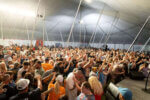
“Despite their own personal faith convictions, many born again Christians embrace certain aspects of universalist thought,” the April 18 report, titled “What Americans Believe About Universalism and Pluralism,” stated. “One-quarter of born again Christians said that all people are eventually saved or accepted by God (25 percent) and that it doesn’t matter what religious faith you follow because they all teach the same lessons (26 percent). An even larger percentage of born again Christians (40 percent) indicated that they believe Christians and Muslims worship the same God.”
A 2008 Pew Forum survey found similar universalist leanings among evangelicals, revealing that that 57 percent of evangelicals agreed with the idea that other religions than their own can lead to eternal life. After tweaking the definition of “evangelical,” however, a subsequent study by LifeWay Research found that only two out of 10 evangelicals agreed with the statement that eternal life can be obtained through religions other than Christianity.
Pointing out an unexpected—and encouraging—outcome of the Barna study, Barna Group president David Kinnaman noted that younger born again Christians stand in stark contrast to their peers, being much less open to inclusive or universalist views of eternity. Still, while they are holding firm on many matters of orthodoxy, young Christians also expressed less certainty than previous generations did about what will happen to them when they die.
“The difference between the Christian community and the cultural norms is even more pronounced among the youngest generations than the older generations,” Kinnaman said. “In other words, younger born again Christians’ attitudes about religious inclusivity and exclusivity are more divergent from their peers than is currently true of their parents’ generation.”
{youtube width=”500″}Vg-qgmJ7nzA{/youtube}







Leave a Comment
You must be logged in to post a comment.